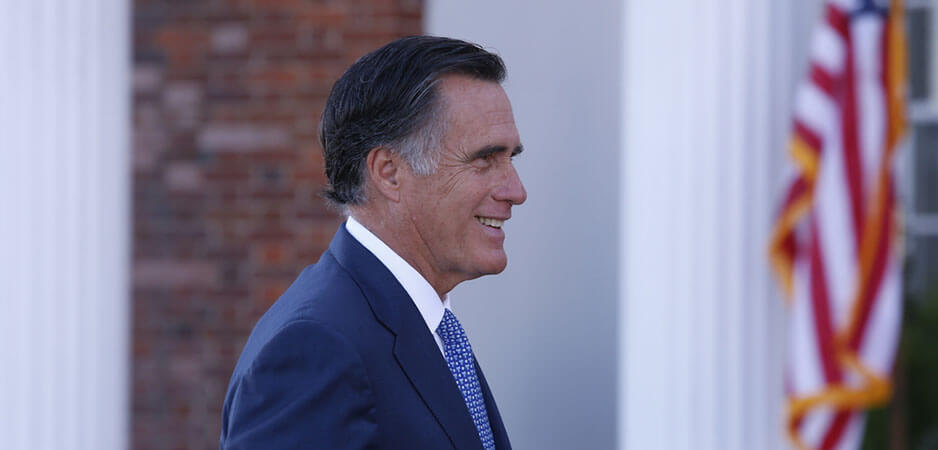After the ignominious departure of James “Mad Dog” Mattis from Trump’s team, Mitt Romney ramps up his mad-dog rhetoric against the president.
Not so long ago, former US presidential candidate Mitt Romney surprised the world by doing what most Republican politicians who saw Donald Trump as an interloper decided to do following the 2016 election: jump on his bandwagon. Before Trump’s election, devout Mormon Romney had called him “a con man” and “a phony, a fraud.” But following Trump’s election, Romney began singing from a different hymn book.
Now, as an elected senator, Romney can focus again on the problem of the presidency. And so, though he doesn’t admit that’s his purpose, as 2019 begins, Romney has kicked off his 2020 presidential campaign in the most spectacular manner, by daring to criticize the Republican in the White House. “Trump’s words and actions,” he tells us, “have caused dismay around the world.”
Here is today’s 3D definition:
Dismay:
A feeling of loss of control and failure to understand, typically the direct result of listening to any politician’s public discourse and comparing their actions
Contextual note
For more than two years, Romney’s perception of the dismay felt by the rest of the world appeared to have become a bit blurred. Immediately after Trump’s election in 2016, the two men spent a “wonderful evening” together over dinner, as the media speculated that Trump might select Romney for secretary of state. Though Rex Tillerson received that honor, Romney, no longer connected to politics, stopped opining either favorably or unfavorably about Trump or much else, until he made the decision in early 2018 to run for the Senate in Utah, where he had conveniently relocated just as Orrin Hatch announced his retirement after decades in the Senate.
Well established in his new home on the range, and content to have received Trump’s endorsement for his campaign, Romney showed his respect for the western tradition, where “seldom is heard a discouraging word,” as he offered nary a word of criticism of the man he once deemed unworthy of the White House. As recently as the day before his election to the Senate, The Guardian could write, concerning Romney’s differences with Trump: “It seems the war of words of 2016 has passed” and those “who hope Romney might step into the shoes of the late John McCain as Trump critic-in-chief are likely to feel short-changed.”
Then, miraculously, just last month, Romney’s gifts of perception returned. As The Guardian now reports: “Romney said Trump’s presidency ‘made a deep descent’ in December.” Trump has once again become the “fake” president, who fails to conform to Romney’s stated ideal of a person who conveys “essential qualities of honesty and integrity” and who can “elevate the national discourse with comity and mutual respect.” He might have added that such a person should also be permitted to silence their honesty and suspend their integrity for periods of up to two years or more, while waiting for the opportunity to step up and “inspire us to follow ‘our better angels.’”
Romney’s improved perception may also be related to the fact that Trump’s position has never been more precarious, leaving an opening for a rare challenge to an incumbent president in a re-election year from within the same party. The last time that happened was 1968, when Lyndon B. Johnson, floundering in the quagmire of Vietnam and finding himself up against two popular anti-war Democratic candidates (Eugene McCarthy and Bobby Kennedy), threw in the towel.
President Trump, who has been unable to build a stable team and is being attacked by those who have resigned, will now be hounded by a Democratic House of Representatives. He may even be impeached. That’s encouraging news for a 71-year-old former Republican presidential candidate and the perfect moment to up the rhetoric he abandoned in 2016.
Romney lost to Barack Obama in 2012, but Obama cannot come back, and the Democrats have no obvious star candidates. Romney has a certain brand and even clan value, since his father was once a credible Republican presidential candidate. He also belongs to the traditional political class that Trump and his hyperreality show have deviated from. Romney is the “real thing,” a mainstream Republican, a very rich — but not filthy rich — establishment figure, who respects rather than flouts traditional “apple pie” American moral principles.
Historical note
On January 3, 2018, Greg Sargent, writing in The Washington Post, cited Romney’s earlier remarks about Trump being unfit for office and asked, “Will Romney reiterate this sentiment, when he’s running for Senate?” Sargent expressed the hope that Romney would return to his initial analysis of the Trump phenomenon and lead a kind of moral rebellion in the Republican Party against the dangerous personality who had taken over the GOP. That didn’t happen in 2018. Instead, after Romney announced his decision to replace retiring Senator Hatch as the Republican candidate in Utah, Trump endorsed Romney.
Now one year later, with the election behind him, Senator Romney can let everything fly against the president who endorsed his candidacy and finally stand up to reveal his true emotions and principles. At the same time, he appears to be jockeying for the privilege of being the “credible,” “moderate” Republican who could push Trump aside in the 2020 primaries and restore order in both the Republican Party and American democracy.
*[In the age of Oscar Wilde and Mark Twain, another American wit, the journalist Ambrose Bierce, produced a series of satirical definitions of commonly used terms, throwing light on their hidden meanings in real discourse. Bierce eventually collected and published them as a book, The Devil’s Dictionary, in 1911. We have shamelessly appropriated his title in the interest of continuing his wholesome pedagogical effort to enlighten generations of readers of the news.]
The views expressed in this article are the author’s own and do not necessarily reflect Fair Observer’s editorial policy.
Support Fair Observer
We rely on your support for our independence, diversity and quality.
For more than 10 years, Fair Observer has been free, fair and independent. No billionaire owns us, no advertisers control us. We are a reader-supported nonprofit. Unlike many other publications, we keep our content free for readers regardless of where they live or whether they can afford to pay. We have no paywalls and no ads.
In the post-truth era of fake news, echo chambers and filter bubbles, we publish a plurality of perspectives from around the world. Anyone can publish with us, but everyone goes through a rigorous editorial process. So, you get fact-checked, well-reasoned content instead of noise.
We publish 3,000+ voices from 90+ countries. We also conduct education and training programs
on subjects ranging from digital media and journalism to writing and critical thinking. This
doesn’t come cheap. Servers, editors, trainers and web developers cost
money.
Please consider supporting us on a regular basis as a recurring donor or a
sustaining member.
Will you support FO’s journalism?
We rely on your support for our independence, diversity and quality.








Commenting Guidelines
Please read our commenting guidelines before commenting.
1. Be Respectful: Please be polite to the author. Avoid hostility. The whole point of Fair Observer is openness to different perspectives from perspectives from around the world.
2. Comment Thoughtfully: Please be relevant and constructive. We do not allow personal attacks, disinformation or trolling. We will remove hate speech or incitement.
3. Contribute Usefully: Add something of value — a point of view, an argument, a personal experience or a relevant link if you are citing statistics and key facts.
Please agree to the guidelines before proceeding.